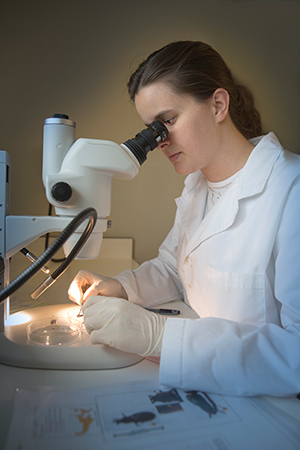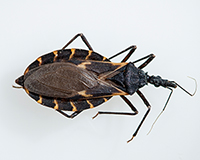Rachel Curtis Receives AAVP Award for Research
COLLEGE STATION, TX – Texas A&M PhD student Rachel Curtis developed a way to educate the public while enlisting their help in tracking an emerging disease that threatens wildlife and humans. Chagas disease is caused by the parasite Trypanosoma cruzi and can cause a variety of symptoms and can even lead to sudden death. Currently, no cure exists. The parasite is transferred among humans-or animals-by “kissing bugs”, named after their tendency to bite around the mouth.

Curtis, who is also a National Science Foundation Graduate Research Fellow and a Texas A&M University College of Veterinary Medicine & Biomedical Sciences (CVM) Merit Fellow, is a member of the epidemiology research team in Dr. Sarah Hamer’s laboratory at the CVM.
As a first-year PhD student, Curtis traveled to Chicago in July for the opportunity to present her ongoing research at the American Association of Veterinary Parasitologists (AAVP) annual meeting. Even though it was her first major oral presentation, she won first place in the Best Student Presentation competition among other graduate students at the event.
“Rachel’s success is a tribute to her hard work and dedication, and the support from her faculty mentor,” said Dr. Robert Burghardt, Acting Associate Dean for Research and Graduate Studies at the CVM. “Our graduate students and faculty are exceptional, and committed to the excellence that defines our research programs.”
“I was happy to be there to hear her presentation and to support her,” said Hamer, Curtis’s advisor and assistant professor in the Department of Veterinary Integrative Biosciences (VIBS) at the CVM. “I’m very fortunate that she’s a part of our team.”
Curtis tracks this disease in nature to determine the risk of becoming infected with Chagas disease. A better understanding of this disease could lead to interventions that break the infection cycle and reduce the disease risk.
“As of January first of 2013, it became a notifiable disease, so if a person or a veterinarian diagnoses Chagas disease in a patient they have to report it to the state,” Curtis said. “Our efforts are augmenting the Texas Department of State Health Services’ ability to track this disease.”

To track Chagas disease, Curtis has to collect blood samples, trap wild animals alive-and catch kissing bugs. Initially, she struggled to catch enough bugs because they were hard to find. She turned to the community for help.

“As soon as we started talking to land owners and the public, they’d say ‘oh yeah, I had one of those in my house yesterday’ or ‘I found some in my barn’ or ‘they were in my dog kennel’,” Hamer said.
Curtis developed the Citizen’s Science initiative to educate the public about Chagas disease and ask the public to collect these hard-to-find bugs. On the Hamer laboratory Web site, Curtis provides the public with educational pamphlets, pictures, and articles.
“Rachel really started this initiative up,” said Hamer. “The public has been really eager to send in these bugs to her. She’s had almost 600 bugs submitted to her this way.”
“Although she is very early in her dissertation research, her studies on Chagas disease in the southern United States are already yielding new insights into maintenance of the Chagas parasite in nature,” said Dr. Evelyn Tiffany-Castiglioni, associate dean for undergraduate education and professor and VIBS department head.
“I’m grateful for all the financial support that the college, the department, and Dr. Hamer have given,” Curtis said. “Without all of the financial resources there would have been no way for the research or for the award to be possible.”


